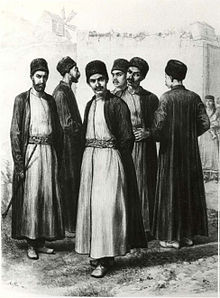
Back Caraís de Crimea AN قريميين Arabic قريميين ARZ Kəraimlər Azerbaijani Ҡарайымдар Bashkir Караімы Byelorussian Караімы BE-X-OLD Караити Bulgarian Krimski Karaiti BS Кхараимаш (къам) CE
 Karaite men in traditional garb, Crimea, 19th century. | |
| Total population | |
|---|---|
| 1,600+ | |
| Regions with significant populations | |
| ~500[1] | |
| 481[2][3] | |
| | 295[4] |
| 346[5] | |
| 231[6] | |
| 215[4] | |
| 192[7] | |
| Languages | |
| Karaim, Crimean Tatar, Lithuanian, Polish, Russian | |
| Religion | |
| Karaism, previously Karaite Judaism | |
| Related ethnic groups | |
| Constantinopolitan Karaites, Karaite Jews, Krymchaks, Samaritans, Ashkenazi Jews, Sephardi Jews, Mizrahi Jews, Crimean Tatars, Urums, Turkic peoples | |
The Crimean Karaites or simply Karaites (Crimean Karaim: Кърымкъарайлар, Qrımqaraylar, singular къарай, qaray; Trakai dialect: karajlar, singular karaj; Hebrew: קראי מזרח אירופה; Crimean Tatar: Qaraylar; Yiddish: קרימישע קאַראַיִמער, romanized: krimishe karaimer), also known more broadly as Eastern European Karaites, are a traditionally Turkic-speaking Judaic ethnoreligious group[8][9] native to Crimea.[10][11][12] Nowadays, most Karaim in Eastern Europe speak the dominant local language of their respective regions.[13]
The Karaite religion, known in Eastern Europe as Karaism, split from mainstream Karaite Judaism in the 19th and 20th centuries. They have lived alongside Krymchaks.[14] Most Karaites in the region do not consider themselves to be Jews, associating the ethnonym with Rabbinical Jews alone, but rather consider themselves to be descendants of the Khazars, non-Rabbinical Judeans, or other Turkic peoples.[15]
Research into the origins of the Karaites indicates they are of ethnic Jewish origin and are genetically closely related to other Jewish diaspora groups.[16][17] Some researchers believe they originated in Constantinople and later settled in the Byzantine Principality of Theodoro.[18]
A closely related group, the Slavic Karaites, were formally accepted into the Karaite ethnoreligious community of Crimea after the deposition of Tsar Nicholas II in 1917. They are descendants of ethnic Russian Subbotniks.[19][20] However, most Slavs claiming to be Karaites in Eastern Europe are not members of the Karaite ethnoreligious community, and are not accepted as legitimate Karaites.
- ^ Kizilov, M. (2008). The Karaites of Galicia : an ethnoreligious minority among the Ashkenazim, the Turks, and the Slavs, 1772-1945. Brill. ISBN 978-90-47-44288-2.
- ^ 1,196 Karaites in Ukraine as a whole (including Crimea) Распределение населения по национальности и родному языку УКРАИНА Distribution of the population by nationality and mother tongue, Ukraine (Russian language version)
- ^ Population in Autonomous Republic of the Crimea = 671, population in Sevastopol city council area = 44. 671+44 = 715. Распределение населения по национальности и родному языку, Автономная Республика Крым (Distribution of the population by nationality and mother tongue, Autonomous Republic of the Crimea )
Распределение населения по национальности и родному языку, Г.Севастополь (горсовет) (Distribution of the population by nationality and mother tongue, Sevastopol city council) - ^ a b "Национальный состав населения Российской Федерации согласно переписи населения 2021 года". Retrieved 2023-01-03.
- ^ Ludność. Stan i struktura demograficzno-społeczna.Narodowy Spis Powszechny Ludności i Mieszkań 2011.
- ^ "UNdata | record view | Population by national and/or ethnic group, sex and urban/rural residence". data.un.org. Retrieved 4 April 2023.
- ^ "Gyventojų ir būstų surašymai - Oficialiosios statistikos portalas". osp.stat.gov.lt. Retrieved 4 April 2023.
- ^ icelds. "Minority categorization and neglected Judaic diversity: the case of Krymchaks and Karaites – ICELDS". Retrieved 2024-08-15.
- ^ Estraikh, Gennady; Glaser, Amelia M. (2021-09-02). "Crimea in the Jewish Imagination: An Introduction". East European Jewish Affairs. 51 (2–3): 139–152. doi:10.1080/13501674.2021.2129342. ISSN 1350-1674.
- ^ Redaktor (2022-03-26). "Preserving the Karaite heritage". Culture. Voice of Crimea. Retrieved 2024-08-15.
- ^ "Этногенез Крымских Караимов » ОФИЦИАЛЬНЫЙ САЙТ КРЫМСКИХ КАРАИМОВ (КАРАИМЫ, КРЫМСКИКЕ КАРАИМЫ, КАРАИМЫ ТЮРКИ)". karai.crimea.ru. Retrieved 2024-08-15.
- ^ Henk108 (2016-02-21). "Trakai Karaite or Trakai Karaim - Travel East and Central Europe". www.codelt.nl. Retrieved 2024-08-15.
{{cite web}}: CS1 maint: numeric names: authors list (link) - ^ Oleksiak, Wojciech (23 July 2015). "The Disputed Origins of Poland's Smallest Ethnic Minority". Culture.pl.
- ^ Elinsky, Kate (2022-10-03). "Insiders and Outsiders". Jewish Review of Books. Retrieved 2024-08-15.
- ^ "תרבות בספרייה הלאומית". live-events.nli.org.il. Retrieved 2024-08-15.
- ^ Brook, Kevin Alan (2014-07-29). "THE GENETICS OF CRIMEAN KARAITES". Karadeniz Araştırmaları (in Turkish). 42 (42): 69–84. doi:10.12787/KARAM859. ISSN 2536-5126.
- ^ Kull, Leon. "The Genetic Signatures of East European Karaites". Jewish Genetics: Abstracts and Summaries.
- ^ "THE KARAITES IN ISTANBUL | History of Istanbul". istanbultarihi.ist. Retrieved 2024-08-15.
- ^ Радченко, Юрий (2023). "Нацистская политика в отношении славян караимского вероисповедания в Крыму (1941–1944)". Ab Imperio. 2023 (3): 77–124. ISSN 2164-9731.
- ^ "Памяти Карамана". karaimspiritual.org. Retrieved 2024-08-15.